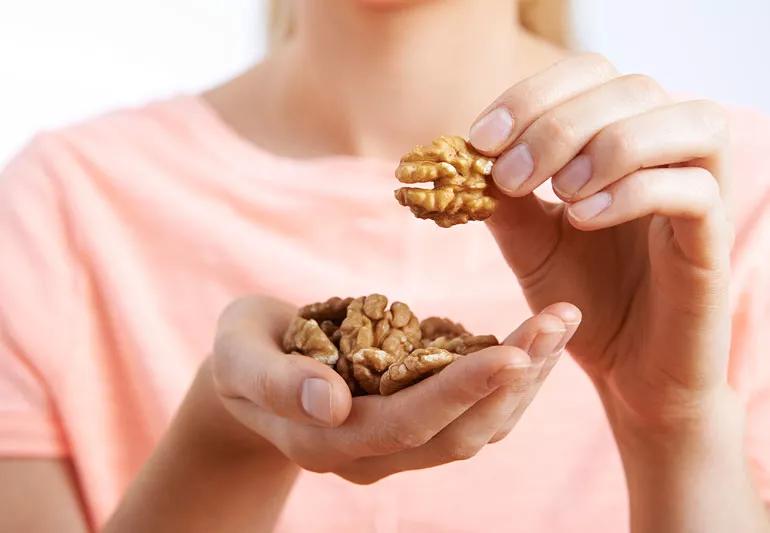5 servings a week shows heart benefits

Image content: This image is available to view online.
View image online (https://assets.clevelandclinic.org/transform/8ade40d8-abad-49f4-941d-3e28a86bff26/eatWalnuts-646881180-770x553_jpg)
Woman eating walnuts from her hand
Walnuts, pistachios, almonds …. By now you know that nuts are an important part of a healthy, whole food diet. But new research shows they may be especially beneficial for people with Type 2 diabetes.
Advertisement
Cleveland Clinic is a non-profit academic medical center. Advertising on our site helps support our mission. We do not endorse non-Cleveland Clinic products or services. Policy
A recent study published in Circulation Research found a lower risk of heart disease and death in people with Type 2 diabetes who ate nuts.
“They showed a significant reduction in cardiovascular risk factors with diabetics when they’re eating at least five servings of nuts a week,” says Julia Zumpano, RD, LD, who did not take part in the study. “The serving size was about an ounce – 28 grams – which is exactly what we recommend.”
The study involved 16,217 men and women with Type 2 diabetes.
Researchers found that the people who ate tree nuts such as walnuts, almonds, Brazil nuts, hazelnuts and pistachios saw the most benefit in terms of reduced heart disease risk, as well as overall death risk.
Nuts have monounsaturated fatty acids, protein and fiber and are low in carbohydrates. This means they help fill us up while keeping blood sugar low, Zumpano says.
She adds that when people eat nuts instead of a carbohydrate-rich or fat-filled snack food when they get hungry, it helps keep their numbers in check.
“Regular nut intake gives you such satiety and fullness and nutrient density that you’re not looking for other snacks to fill up on, therefore helping manage your blood sugars better and your cholesterol profile better,” she says.
Advertisement
Nuts have also been shown to improve good cholesterol and lower bad cholesterol.
Zumpano suggests aiming for three servings of nuts each week. A serving size is an ounce, or about the amount that would fit in the palm of the hand.
Advertisement

Sign up for our Health Essentials emails for expert guidance on nutrition, fitness, sleep, skin care and more.
Learn more about our editorial process.
Advertisement
There are better breakfast options, but if it’s got to be cereal, look for whole grains, high fiber and no added sugar
A diabetes diagnosis, new or long-standing, can trigger reactions like grief, stress, depression and frustration, but symptom relief and help are available
Type 1 diabetes happens when your body doesn’t make insulin, while Type 2 happens when your body can’t use insulin properly
There is an indirect link between the sweet substance and the condition
The short answer: Yes, but you need to eat it in moderation and keep track of how much you consume
Blood glucose monitoring and drinking in moderation can help you avoid hypoglycemia
Sweet potatoes are great, but sweetened drinks aren’t so great
Some sweeteners may have health risks, so it’s best to keep your intake moderate
Type 2 diabetes isn’t inevitable with these dietary changes
Applying a hot or cold compress can help with pain
Pump up your iron intake with foods like tuna, tofu and turkey